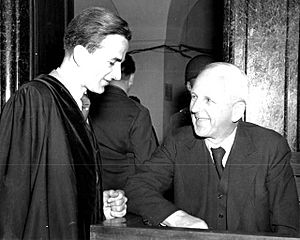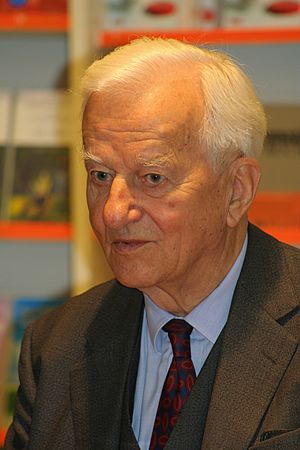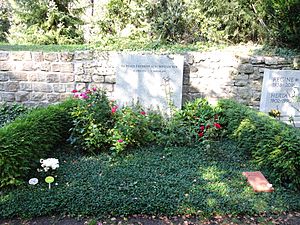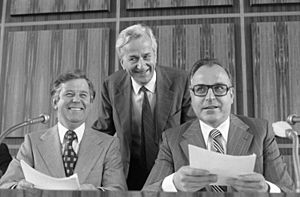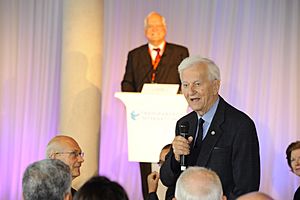Richard von Weizsäcker facts for kids
Quick facts for kids
Richard Freiherr von Weizsäcker
|
|||||||||||||||||||||||||||||||||
|---|---|---|---|---|---|---|---|---|---|---|---|---|---|---|---|---|---|---|---|---|---|---|---|---|---|---|---|---|---|---|---|---|---|
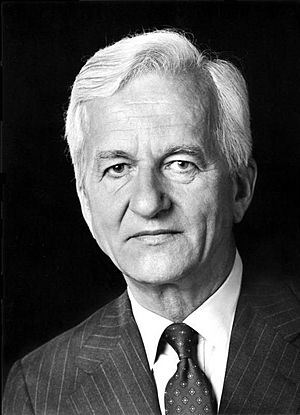
Weizsäcker in 1984
|
|||||||||||||||||||||||||||||||||
| President of Germany | |||||||||||||||||||||||||||||||||
| In office 1 July 1984 – 30 June 1994 |
|||||||||||||||||||||||||||||||||
| Chancellor | Helmut Kohl | ||||||||||||||||||||||||||||||||
| Preceded by | Karl Carstens | ||||||||||||||||||||||||||||||||
| Succeeded by | Roman Herzog | ||||||||||||||||||||||||||||||||
| Governing Mayor of West Berlin | |||||||||||||||||||||||||||||||||
| In office 11 June 1981 – 9 February 1984 |
|||||||||||||||||||||||||||||||||
| Mayor | Heinrich Lummer | ||||||||||||||||||||||||||||||||
| Preceded by | Hans-Jochen Vogel | ||||||||||||||||||||||||||||||||
| Succeeded by | Eberhard Diepgen | ||||||||||||||||||||||||||||||||
| Leader of the Christian Democratic Union in West Berlin |
|||||||||||||||||||||||||||||||||
| In office 21 March 1981 – December 1983 |
|||||||||||||||||||||||||||||||||
| Preceded by | Peter Lorenz | ||||||||||||||||||||||||||||||||
| Succeeded by | Eberhard Diepgen | ||||||||||||||||||||||||||||||||
| Vice President of the Bundestag (on proposal of the CDU/CSU-group) |
|||||||||||||||||||||||||||||||||
| In office 21 June 1979 – 21 March 1981 |
|||||||||||||||||||||||||||||||||
| President | Richard Stücklen | ||||||||||||||||||||||||||||||||
| Preceded by | Richard Stücklen | ||||||||||||||||||||||||||||||||
| Succeeded by | Heinrich Windelen | ||||||||||||||||||||||||||||||||
|
|||||||||||||||||||||||||||||||||
| Personal details | |||||||||||||||||||||||||||||||||
| Born |
Richard Karl Freiherr von Weizsäcker
15 April 1920 Stuttgart, Kingdom of Württemberg, Weimar Republic (now Baden-Württemberg, Germany) |
||||||||||||||||||||||||||||||||
| Died | 31 January 2015 (aged 94) Berlin, Germany |
||||||||||||||||||||||||||||||||
| Political party | Christian Democratic Union (1954–2015) | ||||||||||||||||||||||||||||||||
| Spouse | Marianne von Kretschmann | ||||||||||||||||||||||||||||||||
| Children | 4 | ||||||||||||||||||||||||||||||||
| Alma mater | Balliol College, Oxford University of Göttingen (Dr. jur.) |
||||||||||||||||||||||||||||||||
| Signature | |||||||||||||||||||||||||||||||||
Richard Karl von Weizsäcker was a German politician. He was a member of the CDU party. From 1984 to 1994, he served as the President of Germany.
Born into a noble family, Weizsäcker first held public roles in the Evangelical Church in Germany. He joined the CDU in 1954. In 1969, he was elected to the German parliament, the Bundestag. He stayed there until 1981. Then, he became the Governing Mayor of West Berlin.
In 1984, Weizsäcker was elected President of West Germany. He was re-elected in 1989 for a second term. He and Theodor Heuss are the only two German presidents to serve two full five-year terms. During his second term, on October 3, 1990, Germany was reunified. This made Weizsäcker the President of a united Germany.
Many people consider Weizsäcker Germany's most popular president. He was respected for being fair and unbiased. He was famous for his speeches. One of his most important speeches was on May 8, 1985. This day marked 40 years since the end of World War II in Europe. After he passed away, he was praised for his life and work. The New York Times called him "a guardian of his nation's moral conscience."
Contents
- Richard von Weizsäcker: Germany's President
- Political Career Highlights
- Other Activities and Recognition
- See also
Richard von Weizsäcker: Germany's President
Early Life and Family
Richard von Weizsäcker was born on April 15, 1920. His birthplace was the New Palace in Stuttgart, Germany. His father, Ernst von Weizsäcker, was a diplomat. His mother was Marianne von Graevenitz. Richard was the youngest of four children. His older brother, Carl Friedrich von Weizsäcker, became a famous physicist and philosopher. His other brother, Heinrich, died as a soldier early in World War II.
Richard's grandfather, Karl von Weizsäcker, was a Prime Minister. He was given the noble title of Baron (Freiherr) in 1916. Richard was born in an attic room of the former royal palace. His grandfather still lived there after his term ended.
Growing Up and School
Because his father was a diplomat, Richard lived in different countries. He spent parts of his childhood in Switzerland and Scandinavia. The family lived in Basel, Copenhagen, and Bern. In Bern, he went to the Swiss Gymnasium Kirchenfeld. They also lived in Berlin for several years.
Richard was a very bright student. He skipped a grade in elementary school. He started secondary school at age nine. When he was 17, he went to England. He studied philosophy and history at Balliol College, Oxford. He also studied in France to improve his French. In 1938, he returned to Germany to join the Reichsarbeitsdienst, a national labor service.
World War II Experience
When World War II began, Weizsäcker joined the German army. He became a captain in the reserves. He joined his brother Heinrich's regiment. This regiment had many noble and conservative Prussians. Many of its officers were involved in the 20 July Plot. This was a plan to kill Adolf Hitler.
Weizsäcker helped his friend Axel Freiherr von dem Bussche-Streithorst in a plan to kill Hitler. He provided travel papers for Bussche. This attempt failed. Weizsäcker was also told about the July 20 plot and supported it. The plot ultimately failed. Weizsäcker was wounded in East Prussia in 1945. He returned home to Stuttgart and stayed on a family farm until the war ended.
Education and Family Life
After the war, Weizsäcker studied history at the University of Göttingen. He then studied law. In 1947, his father, Ernst von Weizsäcker, was a defendant in a trial. Richard served as his father's assistant defense lawyer. He completed his law studies in 1953 and earned his doctorate in 1955.
In 1953, he married Marianne von Kretschmann. They had met when she was 18 and he was 30. Weizsäcker later called their marriage "the best and smartest decision of my life." They had four children: Robert, Andreas, Beatrice, and Fritz.
Weizsäcker worked for the company Mannesmann from 1950 to 1958. He was a legal counsel and later head of economic policy. He then worked at a bank and a pharmaceutical company.
Church Involvement
Between 1964 and 1970, Weizsäcker was president of the German Evangelical Church Assembly. He was also a member of the Synod and Council of the Evangelical Church in Germany. He worked to promote peace and understanding. He supported accepting the Oder–Neisse line as Poland's western border. This was important for lasting peace in Europe. His efforts helped the Church promote reconciliation with Poland.
Political Career Highlights
Weizsäcker joined the CDU in 1954. He became a member of the Bundestag (Federal Diet) in 1969. He served there until 1981.
In 1974, he ran for President for the first time. However, he lost to Walter Scheel. From 1979 to 1981, Weizsäcker was the Vice President of the Bundestag.
Governing Mayor of West Berlin (1981–1984)
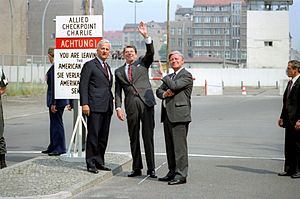
From 1981 to 1984, Weizsäcker was the Governing Mayor of West Berlin. During this time, he worked to keep the idea of Germany as one cultural nation alive. Even though it was divided into two states. He often spoke about Germany's special duties in the East.
He visited Erich Honecker, the East German Communist Party chief, in East Berlin. This was unusual because West Berlin was under the control of the US, France, and Britain. From 1981 to 1983, Weizsäcker led a minority government in West Berlin. His party, the CDU, had won 48 percent of the seats.
President of West Germany (1984–1994)
In 1984, Weizsäcker was elected President of West Germany. He received support from both the ruling parties and the opposition. He took office on July 1, 1984. In his first speech, he spoke about Germany's national identity. He said, "Our situation...is no reason to deny ourselves a national consciousness." He focused on foreign policy in his early years. He traveled widely with Foreign Minister Hans-Dietrich Genscher.
Speech on World War II Anniversary
Weizsäcker was known for his powerful speeches. His most famous speech was on May 8, 1985. This day marked 40 years since the end of World War II in Europe. At that time, West Germany was debating its past. There was also controversy about a visit by US President Ronald Reagan to a military cemetery.
In his speech, Weizsäcker spoke about Germany's historical responsibility. He called May 8 a "day of liberation." He linked the Nazi rise to power to the war's tragedies. He said that many Germans claimed they didn't know about the Holocaust. Weizsäcker strongly disagreed.
He emphasized the danger of forgetting the past. He stated, "There is no such thing as the guilt or innocence of an entire nation. Guilt is...personal." He added, "All of us...must accept the past. We are all affected by the consequences and liable for it." He urged Germans to "look truth straight in the eye." He concluded, "There can be no reconciliation without remembrance."
This speech was highly praised in Germany and worldwide. The New York Times called it "a sober message of hope." The speech was even released on vinyl and sold many copies. It was translated into 13 languages.
Role in the Historians' Dispute
On October 12, 1988, Weizsäcker spoke to historians in Bamberg. He rejected attempts to compare the Holocaust to other mass killings. He said, "Auschwitz remains unique. It was perpetrated by Germans in the name of Germany. This truth is immutable and will not be forgotten." He ended the "historians' dispute" that had divided scholars.
Second Term and German Unification (1989–1994)
Weizsäcker was so respected that he ran for president unopposed in 1989. He was re-elected for his second term on May 23, 1989. During this term, he saw the end of the Cold War. He also oversaw the German reunification.
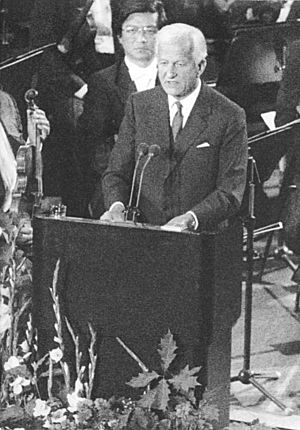
At midnight on October 3, 1990, Germany was reunified. President Weizsäcker gave a short speech at the Reichstag building in Berlin. He praised the unity achieved in freedom and peace. He gave a longer speech later that day at the Berliner Philharmonie.
President of a Unified Germany
In 1990, Weizsäcker became the first German head of state to visit Poland. He assured Poles that Germany would respect their borders. In 1992, he gave the eulogy at the state funeral of former Chancellor Willy Brandt. This was the first state funeral in Berlin for a former chancellor since 1929.
Weizsäcker used his ceremonial role to address important issues. He helped lead reforms on asylum policy. This happened after attacks by neo-Nazis in Mölln and Solingen. He attended memorial services for victims of these attacks. Chancellor Helmut Kohl did not attend, which upset many Germans.
In 1994, Weizsäcker attended the premiere of the film Schindler's List. He was there with the Israeli ambassador.
During the debate about moving the government from Bonn to Berlin, Weizsäcker supported Berlin. He urged more government bodies to move there. He started performing more of his duties in Berlin in 1993. He used his official residence, the Bellevue Palace.
Critique of Party Politics
In 1992, Weizsäcker criticized Germany's political parties. He said they had too much power. He criticized "career politicians" who were only good at political battles. Reactions were mixed. Some politicians disagreed, but a public poll showed that 87.4 percent of people agreed with him. Many saw his comments as a criticism of Chancellor Helmut Kohl.
International Travels
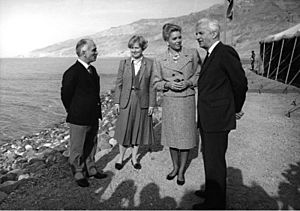
In October 1985, Weizsäcker visited Israel. He was greeted by Israeli President Chaim Herzog. This was the first visit by a German head of state. In July 1986, he visited the United Kingdom. He spoke to both Houses of Parliament. He was the first German to receive this honor.
In 1987, he traveled to Moscow to meet Soviet leader Mikhail Gorbachev. This was a difficult time for German-Soviet relations. Weizsäcker said, "The Germans...have never stopped and will never stop to feel like one nation." His speech was first censored in a Soviet newspaper. But after protests, it was printed in full. Weizsäcker also asked for a pardon for Rudolf Hess, the last inmate in Spandau Prison. This was not successful.
Also in 1987, Erich Honecker, the East German leader, visited West Germany. Weizsäcker did not officially greet him. This was because West Germany did not see East Germany as a foreign state. However, Weizsäcker did receive Honecker at his office.
Post-Presidency Activities
After his presidency, Weizsäcker remained active in politics and charity. He led a commission to reform the German army, the Bundeswehr. He also helped create the American Academy in Berlin. He was a member of the Board of Trustees for the Robert Bosch Stiftung.
Weizsäcker was on the Advisory Council of Transparency International. He also served on many international committees. He chaired a group on the future of the United Nations. He was one of three "Wise Men" advising the European Commission on the future of the European Union. From 2003 until his death, he was on a commission about returning cultural property taken by Nazis. In 2014, he retired as chairman of the Bergedorf Round Table, a foreign policy discussion group.
Death and Funeral
Richard von Weizsäcker passed away in Berlin on January 31, 2015, at age 94. He was survived by his wife, Marianne, and three of their four children. His death brought widespread praise for his life and political work. The Guardian said Germany was "uniquely fortunate" to have him as a leader.
He received a state funeral on February 11, 2015, at Berlin Cathedral. Speeches were given by President Joachim Gauck and other important politicians. Many high-ranking German politicians attended, including Chancellor Angela Merkel. Former leaders from other countries, like Princess Beatrix of the Netherlands and Polish President Lech Wałęsa, were also there. After the ceremony, his coffin was taken to his resting place at Waldfriedhof Dahlem.
Relationship with his Party and Helmut Kohl
Weizsäcker joined the CDU in 1954. He often shared political views that differed from his party's official stance. For example, he urged his party not to completely block Willy Brandt's Ostpolitik. He was one of only three CDU politicians to speak against a vote of no confidence in Chancellor Brandt in 1972. He was always open and friendly with members of other parties.
Helmut Kohl, who was Chancellor from 1982 to 1998, helped Weizsäcker enter parliament. However, their relationship became strained. Weizsäcker criticized Kohl's government many times. He took more liberties than previous presidents in his ceremonial role. He urged Kohl to recognize the Oder–Neisse line and to be more patient about German reunification. His 1985 speech and his 1992 critique of party politics are other examples.
After a critical interview in 1997, Kohl said Weizsäcker was no longer "one of us." The CDU even tried to remove him from their membership. But Weizsäcker won the case, and his membership was allowed to rest. After his death, a German editor called Weizsäcker "the intellectual alternative medicine to Kohl."
After his presidency, Weizsäcker continued to speak out on daily politics. He supported a more open immigration policy. He also favored dual citizenship and changing German citizenship law. He even suggested a coalition government between Social Democrats and the PDS party in Berlin.
Other Activities and Recognition
Weizsäcker received many honors during his life. These included honorary memberships and doctorates from universities like Johns Hopkins University, Oxford, Cambridge, and Harvard. He also received the Leo Baeck Prize. After his death, he was called "the greatest German friend Poland has ever had."
Both Chancellor Angela Merkel and President Joachim Gauck praised Weizsäcker. President Gauck called him "a great man and an outstanding head of state." French President François Hollande highlighted Weizsäcker's "moral stature."
|
Weizsäcker's many awards and honors include:
|
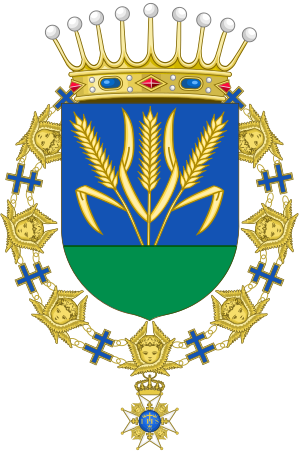
Coat of arms as member of the Order of the Seraphim (Sweden)
His post-presidency activities include:
|
See also
 In Spanish: Richard von Weizsäcker para niños
In Spanish: Richard von Weizsäcker para niños
 | Jessica Watkins |
 | Robert Henry Lawrence Jr. |
 | Mae Jemison |
 | Sian Proctor |
 | Guion Bluford |


